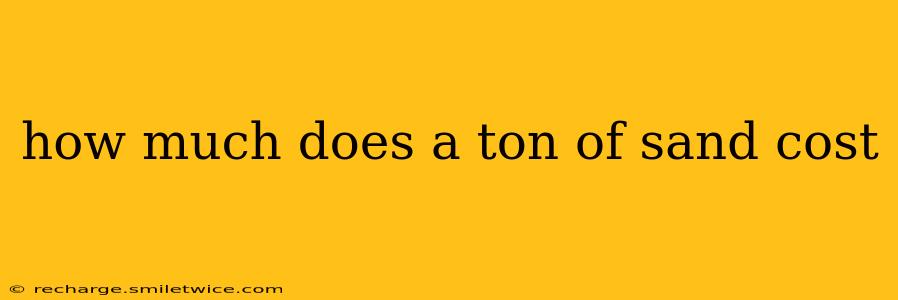How Much Does a Ton of Sand Cost? A Comprehensive Guide
The cost of a ton of sand is surprisingly variable, depending on several key factors. There's no single answer to this question, but understanding these influencing factors will help you get a realistic estimate for your project. This guide will break down the cost, exploring common questions and providing insights to help you navigate the sand market effectively.
What type of sand do you need?
This is a crucial factor affecting price. Different types of sand have different applications and costs:
- Construction Sand: This is the most common type used in concrete, mortar, and landscaping. It's usually less expensive than other types.
- Masonry Sand: Finer than construction sand, it's ideal for bricklaying and mortar work. It often commands a slightly higher price due to its specific properties.
- Play Sand: Specifically washed and cleaned, it's safe for children's play areas. This extra processing increases its cost.
- Filter Sand: Used in water filtration systems, this sand requires very specific sizing and purity, making it the most expensive option.
- Specialty Sands: These include sands for specialized applications like glassmaking or hydraulic fracturing, and their prices vary widely.
Where are you located?
Geographic location significantly impacts the cost. Transportation costs, availability of local sources, and regional demand all play a role. Sand found locally will be cheaper than sand shipped across state lines or internationally.
How much sand do you need?
Bulk purchases typically result in lower per-ton costs. Ordering a single ton might be more expensive per unit than ordering ten or more tons. Suppliers often offer discounts for larger orders.
What's included in the price?
The quoted price might include delivery, or it might be for pickup only. Delivery fees can substantially increase the total cost, especially for longer distances. Taxes and other potential fees should also be considered.
What are the typical price ranges?
While precise pricing is impossible without specifics, here’s a general idea based on US averages (prices are always subject to change):
- Construction Sand: $20-$50 per ton
- Masonry Sand: $25-$60 per ton
- Play Sand: $30-$70 per ton
- Filter Sand: $50-$150+ per ton
How can I find the best price for sand?
- Contact local suppliers directly: Get quotes from multiple suppliers to compare prices and services.
- Check online marketplaces: Some online marketplaces list sand suppliers in your area.
- Visit landscaping or construction supply stores: These stores often offer sand at competitive prices, especially for smaller quantities.
Does the cost of sand vary by season?
Demand for sand can fluctuate seasonally. Construction activity tends to be higher during warmer months, potentially driving up prices.
What are the hidden costs associated with buying sand?
Beyond the price per ton, consider:
- Delivery fees: As mentioned, these can add significantly to the cost.
- Taxes: Sales tax will be added to the final price.
- Disposal fees: If you have excess sand, you might face disposal costs.
In conclusion, the cost of a ton of sand is not fixed. By considering the type of sand needed, your location, the quantity purchased, and the services included, you can effectively estimate the total cost and find the best deal for your project. Remember to obtain multiple quotes to ensure you are getting a fair price.
